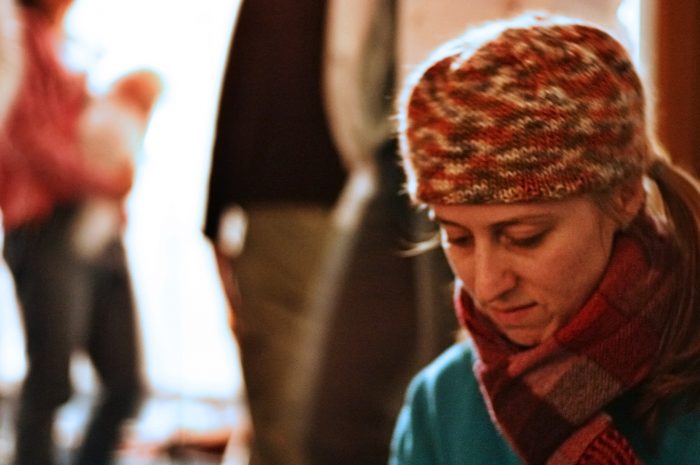Two years ago, I called up my mom and told her my darkest secret.
I told her, probably in too much detail, how one of my friend’s dads sexually assaulted me at a young age. My mom is a loving, spiritually grounded person, and she gave me a gift by listening to my words through my trembling and tears.
Then, a week later, she called me on the phone. “I’ve been meditating on what you told me. And I want you to be open to the possibility that it happened only in a dream or in a past life.”
In other words, she wanted me to question if it really happened. She wanted me to question if the trembling, anxiety, insomnia, flashbacks, and being on high alert for threats at all times were perhaps symptoms from my imagination.
“Mom,” I responded, “If it makes you feel better to believe it was all a dream, I can see how that would be comforting. So go ahead. But my body remembers what happened.”
My mom has since apologized and fully believes and supports me. I have encouraged her to forgive herself, and our love grows deeper as we go through this healing journey together. So why do I share this story?
Because my mom brought to light how far we will go to avoid our own psychological discomfort. As a way to lessen our own feelings of guilt, shame, or fear, it often feels easier to deny or avoid the truth.
And we see this desire to avoid internal discomfort showing up across our personal, social, and political landscape.
It is downright painful to face the fear that we may pollute our earth to the degree that we kill ourselves off. I can understand why many people would prefer to believe that the research on climate change is false, because it helps them stay in their comfort zone.
In a similar pattern, believing survivors of sexual assault brings up discomfort for most people. We saw this in September when Dr. Christine Blasey Ford was ridiculed as a liar after testifying against Brett Kavanaugh.
Many people simply said there was no physical evidence found, and a person is innocent until proven guilty. But I see a deeper current in the urge to discredit survivors. If we accept that a powerful Ivy League graduate like Kavanaugh could commit an atrocious sexual assault, then we can no longer pretend that rape only happens among the underprivileged. When a chorus of voices claimed that his accusers were lying, it may have seemed easier to avoid our internal pain and follow those who said there was no evidence of wrongdoing.
Furthermore, we are hardwired to fear being cast out of our chosen groups. For thousands of years, our survival depended upon people accepting us. Being exiled from the tribe made us more vulnerable to the harsh weather, predators, and starvation. Now we see people following their party leaders at all costs, as if their very survival depended on their compliance.
As a white woman who has at times been preyed upon, and other times been graced with privilege, I am so familiar with the guilt brought up by fully acknowledging the pervasiveness of racial bias and inequality in our world. There are days when I feel like I need to tuck away all of the world’s problems into a corner so I can get up off the couch and make dinner, pulling myself out of the pain.
Our tendency to deny or ignore pain shows up at the intersection of all the social and environmental problems we face. Many of us fear we cannot handle the painful burden of paying attention and acknowledging the truth. As a result, we may choose apathy rather than engaging in political, social, and environmental justice work.
What is the solution, then? How do we face the discomfort of humanity’s intersecting crises, and still have energy to move forward?
We learn to love ourselves.
We learn to accept ourselves and our imperfections and contradictions. And when we love ourselves deeply, we release the energy we need to take positive action, using our gifts to serve the world.
Some of us worry that spending energy on loving ourselves will make us selfish. But self-love flows deeper than narcissism, which is born out of a fear of inadequacy. Bringing true love to all of our beauty and our flaws is the essential first step to universal love. When we are at peace with ourselves, we discover how to love all people and creatures, despite our differences.
But how exactly do we learn to love ourselves? We can start by listening quietly, on a walk, during mindful movements, or sitting still like countless generations of mystics. We can imagine our wounded younger selves in front of us, and acknowledge where our guilt, shame, fear, or discomfort may have originated.
Then we embrace ourselves. We hold our wounded selves in our arms, with love. We let in light, nourishment, support. We speak reassuringly to ourselves, without judgment.
I used to feel my own wounds triggered by any crisis or problem in the world. So I had to shelter myself from the news just so I could get through the day. I am not faulting people for choosing denial or ignorance as a means of self-protection. I deeply understand the urge to push away painful realities.
And at the same time, we need to see the deeper psychological wounds underlying denial. We need to stop trying to convince people with scary facts, and start sharing our own stories of healing, of moving through our own discomfort and pain to find energy to fight for social and environmental justice.
When we are willing to heal our own core wounding, and share our stories when we are ready, we change the world.
We live by example, and reach out a hand to others who are still trapped in their own fear. We show that it is possible to face the painful and scary problems in our world, and stay grounded while we take inspired action.
~












Read 1 comment and reply